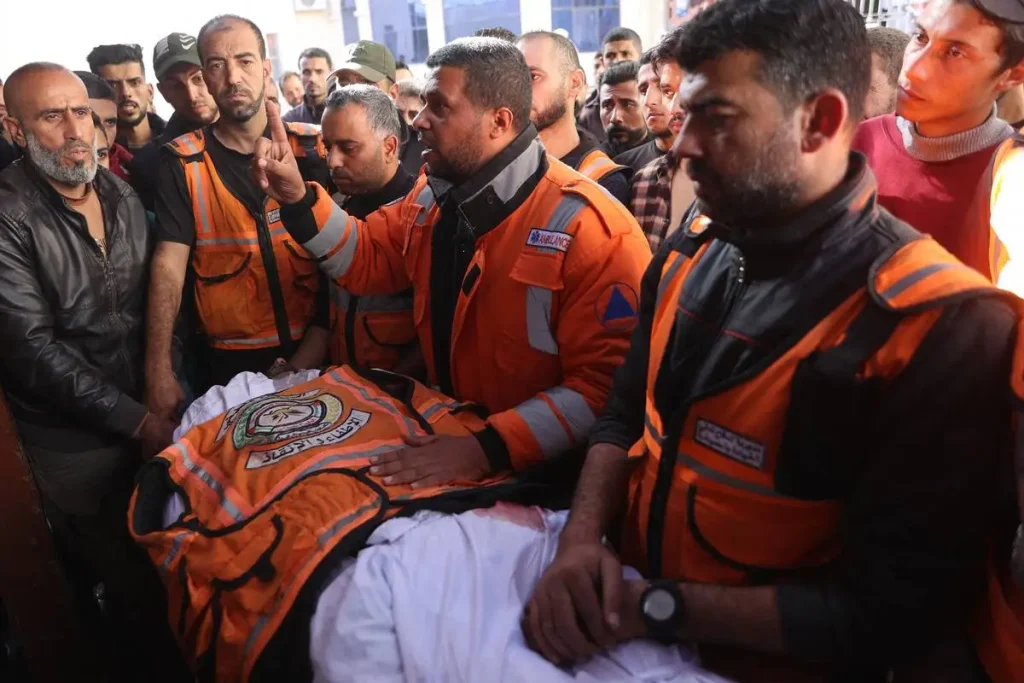In a heartbreaking development amid the intensifying violence in Gaza, nine of a pediatrician’s ten children were killed when an Israeli airstrike struck their family home in Khan Younis, southern Gaza, according to reports from Nasser Hospital, where the doctor, Alaa al-Najjar, is employed. At the time of the strike, she was working in the hospital, tending to patients injured in similar attacks.
The attack left her husband and one surviving son, aged 11, in critical condition. The deadly incident has added to the growing outrage over the high civilian death toll in the ongoing Israeli military operations.
According to the Israel Defense Forces (IDF), the airstrike targeted “several suspects” allegedly operating near Israeli troops in the area. They acknowledged that they are reviewing the reports regarding civilian casualties, including the deaths of children.
Footage authenticated by the BBC showed rescue workers pulling the bodies of the children from the rubble, with local civil defense teams trying to assist survivors. The images from the scene have since circulated globally, intensifying scrutiny over Israel’s military tactics in heavily populated civilian areas.
The tragedy occurred amid a surge in Israeli strikes across Gaza. Gaza’s Health Ministry reported that at least 79 people were killed in a single 24-hour period due to intensified bombing raids. Since the resurgence of hostilities in March 2025, over 3,700 individuals have died, contributing to a staggering death toll that has surpassed 53,000 since the beginning of the broader conflict in October 2023.
The international community has reacted with alarm and condemnation. United Nations Secretary-General António Guterres expressed grave concern over the recent escalation, labeling this phase of the war “perhaps the cruellest.” He highlighted the growing suffering of the Palestinian population, especially children, elderly people, and those unable to flee the combat zones.
Humanitarian conditions in Gaza have reached critical levels. With borders sealed and aid deliveries sporadic, hospitals are overwhelmed, and basic medical supplies are dwindling. Many displaced families have little access to food, water, or shelter, and humanitarian organizations have repeatedly called for the immediate protection of civilians and the creation of safe corridors for aid.
The story of Dr. Alaa al-Najjar and her family has become a powerful symbol of the immense human toll the war has exacted on Gaza’s civilians. Her personal loss underscores the vulnerability of families living in the densely populated enclave, where military strikes can claim entire households in seconds.
Global human rights organizations, aid agencies, and political leaders have demanded urgent steps to prevent further civilian casualties. They are calling for transparent investigations into incidents involving non-combatants and for a renewed diplomatic push toward ceasefire negotiations.
As the war grinds on, with no immediate resolution in sight, the tragedy of Dr. al-Najjar’s family serves as a stark reminder of the real people behind the statistics—families torn apart, children lost, and lives forever changed by conflict. The international community continues to urge restraint and accountability in hopes of preventing further such tragedies.





More Stories
Stranded Before the Festival: Air India Flight Cancellation Leaves Dozens in Milan Without a Way Home for Deepavali
Massive Gujarat Cabinet Overhaul: Harsh Sanghavi Promoted, Rivaba Jadeja Makes Political Debut
India Rejects Trump’s Statement on Russian Oil, Reaffirms Energy Sovereignty